动词时态复习
高三英语专项复习-动词时态
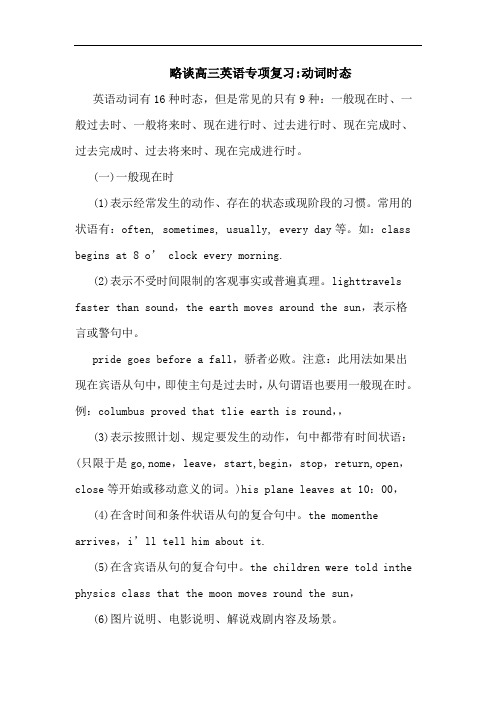
略谈高三英语专项复习:动词时态英语动词有16种时态,但是常见的只有9种:一般现在时、一般过去时、一般将来时、现在进行时、过去进行时、现在完成时、过去完成时、过去将来时、现在完成进行时。
(一)一般现在时(1)表示经常发生的动作、存在的状态或现阶段的习惯。
常用的状语有:often, sometimes, usually, every day等。
如:class begins at 8 o’ clock every morning.(2)表示不受时间限制的客观事实或普遍真理。
lighttravels faster than sound,the earth moves around the sun,表示格言或警句中。
pride goes before a fall,骄者必败。
注意:此用法如果出现在宾语从句中,即使主句是过去时,从句谓语也要用一般现在时。
例:columbus proved that tlie earth is round,,(3)表示按照计划、规定要发生的动作,句中都带有时间状语:(只限于是go,nome,leave,start,begin,stop,return,open,close等开始或移动意义的词。
)his plane leaves at 10:00,(4)在含时间和条件状语从句的复合句中。
the momenthe arrives,i’ll tell him about it.(5)在含宾语从句的复合句中。
the children were told inthe physics class that the moon moves round the sun,(6)图片说明、电影说明、解说戏剧内容及场景。
(7)在某些到装句中,用一般现在时表示现在正在发生的动作。
look out!here comes a bus,(二)一般过去时1)表示过去的动作或状态。
2)表示过去一段时间内经常发生的动作。
英语动词时态复习笔记

was doing; were doing
否定:wasn’t doing; weren’t doing
/
from 7:00 to 8:00 yesterday; this time yesterday; while;when+过去某个时刻做事
一般将来时
will do; am going to do , is going to do, are going to do
so far到目前为止;
过去完成时
had done
否定:hadn’t been
By the end of/By the time+过去时间;Before+过去事件;过去事件+after
动词各时态复习笔记
would be
否定:wouldn’t be
宾语从句:主句过去从句将来
现在完成时
have done(过去分词);
has done
否定:haven’t done; hasn’t done
have been; has been
否定:haven’t been; hasn’t been
already, yet;since+时间点; for+一段时间;How long have/has...;in recent years,in the past few years在最近几年; recently最近;
现在进行时
am doing, is doing, are doing
否定:am not doing, isn’t doing; aren’t doing
/
now, at the moment此刻;at present目前;look, listen; Be quiet; Don’t wake up...不要吵醒...;
高中英语语法复习讲义+训练:动词的时态(含答案)

中学英语语法复习讲义——动词的时态一. 概念:时态是英语谓语动词的一种形式,表示动作发生的时间和所处的状态.英语中的时态是通过动词形式本身的变更来实现的.英语有16种时态,但中学阶段较常用的有十种:一般现在时,一般过去时,一般将来时,过去将来时,现在进行时,过去进行时,将来进行时,过去完成时,英在完成时和现在完成进行时.二.相关学问点精讲1.一般现在时的用法1) 常常性或习惯性的动作,常与表示频腮度的时间状语连用。
时间状语:every…, sometimes,at…, on Sunday。
例如:I leave home for school at 7 every morning. 每天早上我七点离开家。
2) 客观真理,客观存在,科学事实。
例如:The earth moves around the sun. 地球绕太阳转动。
Shanghai lies in the east of China. 上海位于中国东部。
3) 表示格言或警句。
例如:Pride goes before a fall.骄者必败。
留意:此用法假如出现在宾语从句中,即使主句是过去时,从句谓语也要用一般现在时。
例:Columbus proved that the earth is round. 哥伦布证明了地球是圆的。
4) 现在时刻的状态、实力、性格、特性。
例如:I don't want so much. 我不要那么多。
Ann writes good English but does not speak well. 安英语写得不错,讲的可不行。
比较:Now I put the sugar in the cup. 把糖放入杯子。
I am doing my homework now. 我正在做功课。
第一句用一般现在时,用于操作演示或指导说明的示范性动作,表示言行的瞬间动作。
其次句中的now是进行时的标记,表示正在进行的动作的客观状况,所以后句用一般现在时。
完整复习动词的时态一般现在时现在进行时现在完成时一般过去时

(完整)复习动词的时态:一般现在时、现在进行时、现在完成时、一般过去时编辑整理:尊敬的读者朋友们:这里是精品文档编辑中心,本文档内容是由我和我的同事精心编辑整理后发布的,发布之前我们对文中内容进行仔细校对,但是难免会有疏漏的地方,但是任然希望((完整)复习动词的时态:一般现在时、现在进行时、现在完成时、一般过去时)的内容能够给您的工作和学习带来便利。
同时也真诚的希望收到您的建议和反馈,这将是我们进步的源泉,前进的动力。
本文可编辑可修改,如果觉得对您有帮助请收藏以便随时查阅,最后祝您生活愉快业绩进步,以下为(完整)复习动词的时态:一般现在时、现在进行时、现在完成时、一般过去时的全部内容。
复习动词的时态:一般现在时、现在进行时、现在完成时、一般过去时。
•一般现在时(The Present Indefinite Tense)的测试 5 要点:1、表示不受时间限制的客观存在、科学真理、格言等。
Water boils at 100 °C 。
Twice two is four 。
The earth goes around the sun 。
Pride goes before a fall。
骄者必败。
One today is worth two tomorrows。
一个今天胜过两个明天。
Practice makes perfect。
熟能生巧。
Japan lies to the east of China 。
Shanghai stands on the Huangpu River .England and France are separated by the English Channel .2、一般现在时表示经常地或者习惯的动作,常与频度状语usually , often , sometimes ,every morning ,always ,regularly 以及at present , these days,nowadays,at the moment 等时间状语连用。
英语动词时态复习
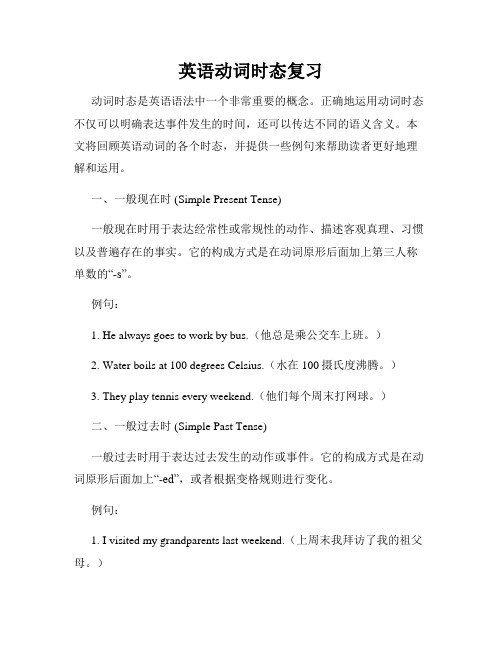
英语动词时态复习动词时态是英语语法中一个非常重要的概念。
正确地运用动词时态不仅可以明确表达事件发生的时间,还可以传达不同的语义含义。
本文将回顾英语动词的各个时态,并提供一些例句来帮助读者更好地理解和运用。
一、一般现在时 (Simple Present Tense)一般现在时用于表达经常性或常规性的动作、描述客观真理、习惯以及普遍存在的事实。
它的构成方式是在动词原形后面加上第三人称单数的“-s”。
例句:1. He always goes to work by bus.(他总是乘公交车上班。
)2. Water boils at 100 degrees Celsius.(水在100摄氏度沸腾。
)3. They play tennis every weekend.(他们每个周末打网球。
)二、一般过去时 (Simple Past Tense)一般过去时用于表达过去发生的动作或事件。
它的构成方式是在动词原形后面加上“-ed”,或者根据变格规则进行变化。
例句:1. I visited my grandparents last weekend.(上周末我拜访了我的祖父母。
)2. She studied English in high school.(她在高中学习英语。
)3. They played basketball yesterday.(他们昨天打篮球。
)三、一般将来时 (Simple Future Tense)一般将来时用于表达将来发生的动作或事件。
它的构成方式是在助动词“will”后面加上动词原形。
例句:1. We will have a party tomorrow.(我们明天将举办一个派对。
)2. He will travel to Europe next month.(他下个月将去欧洲旅行。
)3. They will meet at the park later.(他们一会儿在公园见面。
)四、现在进行时 (Present Continuous Tense)现在进行时用于表达现在正在进行或暂时性发生的动作。
2024年中考复习时态专项(课件)

五、【过去进行时】
试卷讲评课件
1.结构:主语+be(was/were)+doing(动词的现在分词形式) 2.定义: (1)过去某一时刻或阶段正在进行的动作 They were swimming at 3:00pm yesterday. (2)表示一个动作发生时另一个动作正在进行,常与when.while等引导时 间状语的词连用 I was doing my homework while my mom is cooking. 3.时间状语:at the time of… 在…的时候 at this/that time 在这时/在那 时/ at +点钟+过去的时间.when.while等引导过去时间状语的从句
一Oh! It ________ (leave )some sweet memories in my heart in the past several months. 17.—Is Helen here?一No, she isn't here. She ________ (arrive) in half an hour.
高三英语 动词时态复习——复习一般将来时、过去将来时、过去进行时、过去完成时 知识精讲
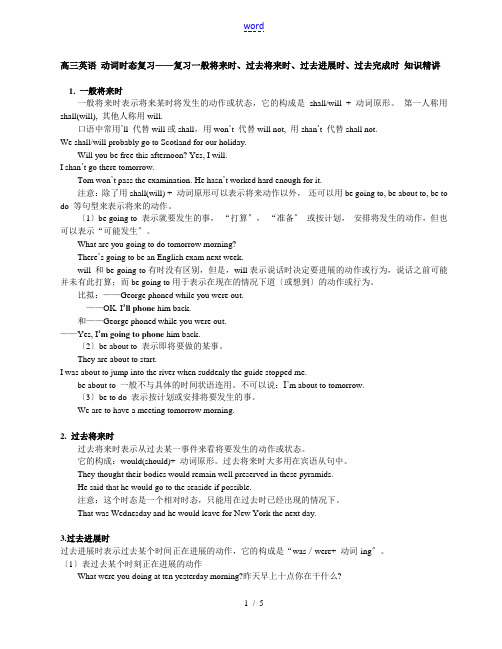
高三英语动词时态复习——复习一般将来时、过去将来时、过去进展时、过去完成时知识精讲1. 一般将来时一般将来时表示将来某时将发生的动作或状态,它的构成是shall/will + 动词原形。
第一人称用shall(will), 其他人称用will.口语中常用’ll 代替will或shall,用won’t 代替will not, 用shan’t 代替shall not.We shall/will probably go to Scotland for our holiday.Will you be free this afternoon? Yes, I will.I shan’t go there tomorrow.Tom won’t pass the examination. He hasn’t worked hard enough for it.注意:除了用shall(will) + 动词原形可以表示将来动作以外,还可以用be going to, be about to, be to do 等句型来表示将来的动作。
〔1〕be going to 表示就要发生的事,“打算〞,“准备〞或按计划,安排将发生的动作,但也可以表示“可能发生〞。
What are you going to do tomorrow morning?There’s going to be an English exam next week.will 和be going to有时没有区别,但是,will表示说话时决定要进展的动作或行为,说话之前可能并未有此打算;而be going to用于表示在现在的情况下道〔或想到〕的动作或行为。
比拟:——George phoned while you were out.——OK. I’ll phone him back.和——George phoned while you were out.——Yes, I’m going to phone him back.〔2〕be about to 表示即将要做的某事。
2023中考英语语法复习之考点专题——动词时态(原卷版)
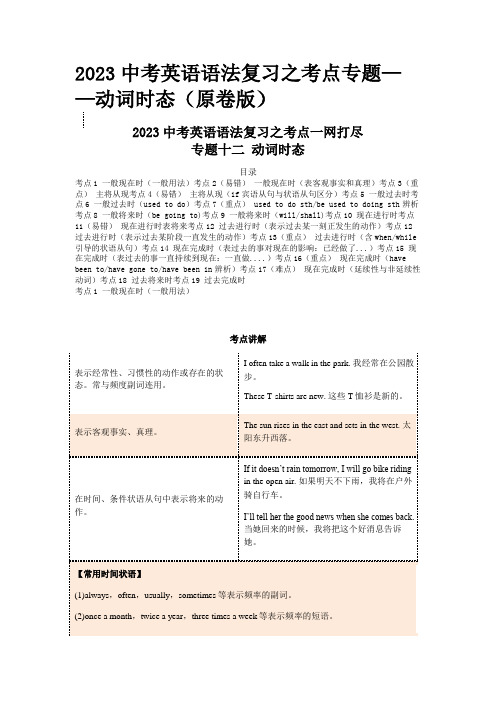
2023中考英语语法复习之考点专题——动词时态(原卷版)2023中考英语语法复习之考点一网打尽专题十二动词时态目录考点1 一般现在时(一般用法)考点2(易错)一般现在时(表客观事实和真理)考点3(重点)主将从现考点4(易错)主将从现(if宾语从句与状语从句区分)考点5 一般过去时考点6 一般过去时(used to do)考点7(重点) used to do sth/be used to doing sth辨析考点8 一般将来时(be going to)考点9 一般将来时(will/shall)考点10 现在进行时考点11(易错)现在进行时表将来考点12 过去进行时(表示过去某一刻正发生的动作)考点12 过去进行时(表示过去某阶段一直发生的动作)考点13(重点)过去进行时(含when/while 引导的状语从句)考点14 现在完成时(表过去的事对现在的影响:已经做了...)考点15 现在完成时(表过去的事一直持续到现在:一直做....)考点16(重点)现在完成时(have been to/have gone to/have been in辨析)考点17(难点)现在完成时(延续性与非延续性动词)考点18 过去将来时考点19 过去完成时考点1 一般现在时(一般用法)考点讲解1.(2021·上海松江·二模)Tim likes watching films. He _________ to the cinema with his girlfriend once a week.A.goes B.is going C.has gone D.will go2.(2020·湖北恩施)I hear that it often ________ in Sichuan and there are usually floods, especially in summer.A.rains B.rained C.will rain3.(2021·北京房山·二模)Mary ________ her grandparents every weekend.A.visits B.was visiting C.is visiting D.has visited4.(2021·广西桂林)The zebra eats grass, but it ________ eat meat.A.doesn’t B.didn’t C.don’t5.(2021·黑龙江·齐齐哈尔市碾子山区教师进修学校一模)—Do you like the flower? —Yes. It ________ sweet.A.is smelling B.smells C.smelt考点2(易错)一般现在时(表客观事实和真理)考点讲解精选练习6.(2020·天津红桥·二模)In the past, people didn't know the earth ________round the sun. A.going B.goes C.will go D.go7.(2021·吉林长春·模拟预测)The teacher told us that the sun ________ in the east. A.rises B.rise C.rose D.rising考点3(重点)主将从现考点讲解精选练习8.(2021·四川乐山)—What’s your plan for the summer holiday?—I’ll go to Chendu as soon as the school term ___________.A.end B.ends C.will end9.(2021·广西河池)Mrs. Green will take her son to the amusement park if she ________ the tickets.A.got B.gets C.is getting D.will get10.(2021·辽宁丹东)We can’t avoid traffic accidents unless everyone ________ the rules. A.follows B.breaks C.will follow D.will break考点4(易错)主将从现(if宾语从句与状语从句区分)考点讲解精选练习11.(2021·辽宁鞍山)—Tina wants to know if you ________ to the park with us tomorrow. —I’d love to. But if it ________, I may go to the library instead.A.go; will rain B.go; rains C.will go; rains D.will go; will rain12.(2020·黑龙江牡丹江)—I wonder if we ________a farewell party next week. —If we________it, I will call you.A.will have ; have B.have;will have C.will have; will have13.(2021·黑龙江哈尔滨)—I wonder if you ________ us for the English party tomorrow. —If I ________ free, I will go with you.A.will join, am B.will join, will be C.join, am考点5 一般过去时考点讲解精选练习14.(2021·广西贵港)—Where does Bill live? —He ________ me his address, but I can’t remember it now.A.tells B.told C.is telling D.will tell15.(2021·四川达州)— Alice has gone out. — Oh, has she? What time ________ she________?A.has; gone B.will; go C.did; go D.is; going16.(2021·江苏徐州)In my school days, I ________ a lot of reading in English every day. That was how I learned English at that time.A.do B.did C.have done D.will do17.(2021·重庆)Last Sunday my brother and I ________ our grandparents.A.will visit B.visits C.visit D.visited18.(2021·内蒙古兴安盟)— Have you ever been to Shanghai? — Of course. Actually, I________ there for six years, but now I live in Beijing.A.worked B.was working C.would work D.have worked考点6 一般过去时(used to do)考点讲解精选练习19.Mr Jiang isn’t as busy as before because there ___________no home robot to help him.A.used to be B.may be C.used to have D.may have20.I ________ in this small mountain village when I was a child.A.use to live B.used to living C.used to live D.used to life21.(2019·江苏镇江)Yao Ming, a basketball giant , ___________ water polo when he was young.A.is playing B.used to play C.is used to playing D.was playing考点7(重点) used to do sth/be used to doing sth辨析考点讲解精选练习22.(2020·湖南益阳)Diana used to _________ to work, but now she is used to ________ because the road is crowded and she wants to keep fit.A.drive; walk B.drive; walking C.driving; walk23.Dick __________ in America, but he has been ___________ Chinese food since he moved to China.A.used to live; used to eating B.is used to live; used to eat C.is used to live; used to eating D.used to living; used to eat24.—How does your brother go to school? —He ___________ ride a bike, but now he__________ there to keep fit.A.used to; is used to walk B.used to; is used for walking C.was used to; is used to walking D.used to; is used to walking考点8 一般将来时(be going to)考点讲解一般将来时表示将来某个时间要发生的动作,事情或存在的状态,也表示将来经常或反复发生的动作或事情。
动词的时态的复习
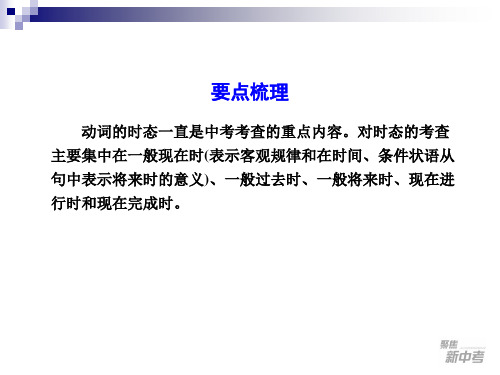
(4)come, go, move, leave, stay等动词的现在进行时可以表示 按计划将要发生的事。如:
I’m leaving tomorrow. 明天我要走了。 They are going camping for vacation. 他们度假要去野营。 Are you staying here till next week? 你会在这儿呆到下周吗?
要点梳理
动词的时态一直是中考考查的重点内容。对时态的考查 主要集中在一般现在时(表示客观规律和在时间、条件状语从 句中表示将来时的意义)、一般过去时、一般将来时、现在进 行时和现在完成时。
Ⅰ.一般现在时: 一般现在时用动词原形来表示。当主语为第三人称单数时, 动词要变为第三人称单数形式。 1.表示经常性或习惯性的动作、存在的状态或现阶段的习惯 行为。 常用的时间状语:every day, usually, always, often, sometimes, on Sunday, once a week等。 如:I go to school at 7 every morning. 每天早上我七点去上学。 2. 表示目前的情况,特点或状态。 如:I am a teacher. 我是教师。 She likes watching TV. 她喜欢看电视。
come/arrive/reach/ get/move to—be in/at come back—be back
buy—have borrow—keep go out—be out die—be dead leave—be away return—be back go to bed—be in bed become—be go to sleep—sleep
Ⅲ.现在进行时: 现在进行时表示现阶段或说话时正在进行的动作及行为,常 和now, at this time, these days等时间状语连用。句子基本结构为: be动词am/is/are+现在分词。 如:Look, they are running. 看,他们正在跑步。
专题01 动词的时态及语态(原卷版)(全国通用版)-高考英语复习

专题01 动词的时态及语态时态知识梳理重点用法1 一般现在时用法:1.be(am,is,are)动词的使用由主语的人称和数决定。
行为动词的第三人称单数加-s/es,其余人称用动词原形。
I am free tonight.我今晚有空。
The boy is ten years old.这个男孩10岁了。
They are students.他们是学生。
Bill often helps others.We like him a lot.比尔总是帮助他人。
我们很喜欢他。
2.表示经常、习惯性发生的动作或存在的状态。
It often rains in our city.我们的城市经常下雨。
3.表示普遍真理和客观真实。
The earth moves round the sun.地球围绕太阳转。
4.表示心理状态或情感的动词往往用一般现在时。
She hates rock music.她讨厌摇滚乐。
5.在时间、条件状语从句中表示将来的动作。
I will call on you as soon as I am free.我空闲时会去拜访你。
提示:一般现在时可以用来代替一般将来时,表示已经预先计划或安排的肯定将要发生的动作,句中常有表示将来时间的状语。
这一用法主要用于下列动词,如果arrive(到达),be (是),begin(开始),come(来到),go(去),leave(离开),reach(到达),start(出发)等。
The train leaves at eight o’clock.火车8点钟开车。
注意:一般现在时常用的时间状语有:today今天often经常always一直sometimes有时usually通常seldom很少on Sunday在星期天every day/week/morning每天/每周/每天早上重点用法2 一般过去时用法:1.be(was/were)动词的使用由主语的人称和数决定。
行为动词都要用过去式。
英语中考归纳复习专题:动词的时态
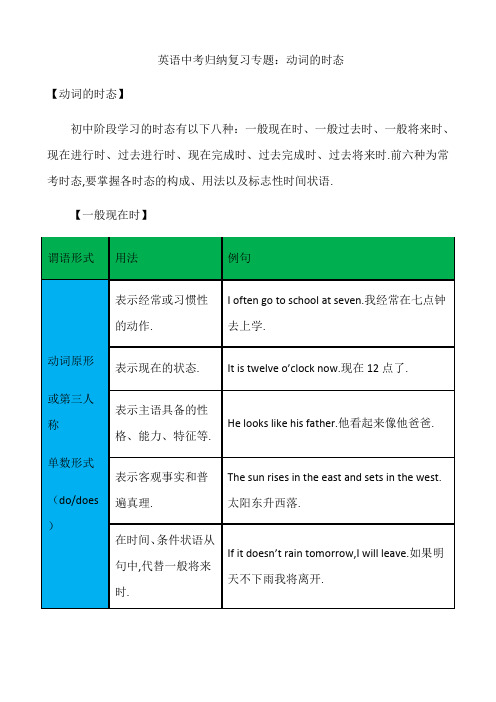
英语中考归纳复习专题:动词的时态【动词的时态】初中阶段学习的时态有以下八种:一般现在时、一般过去时、一般将来时、现在进行时、过去进行时、现在完成时、过去完成时、过去将来时.前六种为常考时态,要掌握各时态的构成、用法以及标志性时间状语.【一般现在时】【考点训练1】1.My father is a teacher and he _________ (teach) in a middle school.2.Yesterday the teacher told us the earth _______ (go) around the sun.3.—When shall we begin our meeting?—We’ll begin it when Helen ___ . ()esB.cameC.will comee4.—How do you usually go to school?—I usually ___ to school on foot. ()A.goB.wentC.was goingD.will go答案:teaches goes A A【一般过去时】要点提醒:“used to+动词原形”表示过去的习惯或状态.如:Mum used to tell us stories.妈妈过去常给我们讲故事.【考点训练2】1.Mike ________ (not go) to bed until 12 o’clock last night.2.He asked if I _____ (be) a student.3.Will you please say it again?I ___ quite ___ you.()A.don’t;hearB.didn’t;hearC.don’t;heardD.didn’t;heard4.He _____ go out with his parents,but now he ____ staying at home alone. ()ed to;is used toB.is used to;used toe to;is used toed to;used to答案:didn’t go was B A【一般将来时】要点提醒:be going to与will的区别1.be going to 指已计划好的事或思考过的意图、打算,will表示未事先思考或未计划而临时做出的决定.如:I’m going to see him tomorrow.我打算明天去看他.(事先经过思考)I’ll answer the door.我去开门.(未经事先考虑)2.be going to可表示客观迹象表明马上要发生的事,而will则表明说话者的主观意愿.如:Look at the clouds.There is going to be a storm.看看这些云,暴风雨就要来了.(客观迹象表明要发生)I hope it will be warm tomorrow.我希望明天会暖和起来.(主观意愿)3.在含有条件状语从句的复合句的主句中,一般用will,不用be going to. 如:I will come if it doesn’t rain.如果不下雨的话,我就来.【考点训练3】1.____ a concert in our school next Saturday. ()A.There isB.There areC.There will beD.There will have2.If they can arrive by 9:00 am,we ___ a meeting.()A.haveB.will haveC.hadD.would have3.He ___ her a beautiful hat on her next birthday.()A.givesB.gaveC.will givingD.is going to give答案:C B D 【现在进行时】【考点训练4】1.They ____________ (have) a math test in the classroom now.2.Look! He ___________ (lie) on the beach.3.—Pass the raincoat to me.It ___ hard now.—Here you are. ()A.rainB.is rainingC.rainedD.will rain4.—Cathy,can you answer the door?I ___ the room.—I’m coming,Mum. ()A.CleanB.cleanedC.have cleanedD.am cleaning答案:are having is lying B D【过去进行时】He was forever com plaining about something.他老是怨这怨那.要点提醒:1.在含有时间状语从句的复合句中,延续时间较长的动作常用过去进行时,另一个短暂性动作用一般过去时.如:When the UFO landed,I was shopping at the clothes store.当UFO落地时,我正在服装店买衣服.2.表示两个延续性动作在过去某一时刻同时进行,不考虑动作的先后顺序,主句和从句的谓语动词都用过去进行时,连词常用while.如:Tom was doing his homework while I was reading a newspaper.我在看报纸时,汤姆在做作业.【考点训练5】1.Mike and I ___________ (play) basketball at that time yesterday afternoon.2.While Mr.Johnson _______________ (work) in the office,the phone rang.3.The girl ___ for the bus when the rainstorm came.()A.waitedB.have waitedC.is waitingD.was waiting4.—Jenny,I called you at nine last night,but you didn’t pick up.—Oh,I ____ a popular program called Go Fighting!.()A.watchB.watchedC.was watchingD.am watching答案:were playing was working D C【现在完成时】要点提醒:1.have/has been to,have/has gone to与have/has been in(考点讲解详见P74考点1)2.延续性动词与非延续性动词英语中的动词按动作发生的方式、发生过程的长短可分为延续性动词和非延续性动词两种,非延续性动词也可称为短暂性动词或瞬间动词.在现在完成时态中,有时要将非延续性动词转换为延续性动词,这样才能和时间段连用.转换方法如下:(1)将短暂性动词转换为“be+形容词或副词”.请看下表:如:这间商店开门6小时了.The shop has opened for 6 hours.( ×)The shop has been open for 6 hours.( √)(2)有的短暂性动词可以转换为意思相同的延续性动词.请看下表:如:这本书我借了一个月了.I have borrowed the book for one month.( ×)I have kept the book for one month.( √)3.现在完成时与一般过去时的区别现在完成时强调某一动作或状态对现在造成的影响或结果,不能和表示过去的时间状语连用;一般过去时只表示过去的事实,不表示和现在的关系,可以和表示过去的时间状语连用.如I bought a ticket yesterday.我昨天买了一张票.(强调我昨天做的一件事是买票)I have already bought a ticket.我已经买了一张票.(强调我已经有票了,无须再惦记票的事了)4.现在完成时的其他句型【考点训练6】1.—you _____ your homework yet?—Yes.I ______ it a moment ago. ()A.Did;do;finishedB.Have;done;finishedC.Have;done;have finishedD.Will;do;finish2.His father ___ the Party since 1978. ()A.joinedB.has joinedC.was inD.has been in3.Miss Green isn’t in the office.She to the library. ()A.has goneB.wentC.will goD.has been 答案:B D A【过去完成时】had + 过去分词表示在过去的过去发生的动作或存在的状态.I had had three pieces of cake when you arrived.你来的时候我已经吃了三块蛋糕了.表示过去某一动作或状态持续到过去另一时间.The old man had lived in Shanghai for ten years beforeTom came here.汤姆来这儿之前,这个老人已经住在上海十年了.时间标志by the time...,before,when等构成的短语或引导的从句【考点训练7】1.在我们到达电影院之前,电影已经开始了.The film __________ before we _______ to the cinema.2.警察赶到时,小偷已经逃跑了.When the police __________,the thief____________________ .答案:had begun got arrived had run away 【过去将来时】【考点训练8】1.李明说如果布莱恩下个月来中国,他将会很高兴.Li Ming said he ___________ happy if Brian came to China the next month.2.蒂娜说她下周三打算来参加我的生日派对.Tina said she ________________ my birthday party the next Wednesday.答案:would be was going to【中考示例】(2017·广西)If he _____ Guilin,he’ll probably go to Yangshuo. ( )A.visitsB.is visitingC.will visitD.has visited【解析】考查动词的时态.句意:如果他游览桂林,他有可能会去阳朔.if引导条件状语从句时,时态遵循“主将从现”原则,从句中用一般现在时表示将来.【考题热身】1.(2017·甘肃)I promise I ________ (send) you an email to explain all of these tomorrow.2.(2017·甘肃)Be quiet! The patients ______________(sleep).3.(2017·鄂州)Sandy’s grandparents__________________ (marry) for 50 years.4.(2017·台州改编)A true friend always ____________(support) you whenever youare in trouble.5.(2017·宿迁)I ______________(wash) the dishes while my sister was sweeping the floor.6.(2017·云南)—What do you think of your hometown, Kate?—It a lot.It’s more beautiful than before. ()A.has changedB.changesC.will changeD.change7.(2017·武汉)—Linda is not coming for the party tonight.—But she ______!()A.promisesB.promisedC.will promiseD.had promised8.(2017·毕节)It’s nice to see you again.We ___ each other since 2016. ()A.won’t seeB.haven’t seenC.don’t seeD.didn’t see9.(2017·黔东南)If it doesn’t rain this weekend,we ___ a picnic in the Jinquan Park. ()A.haveB.will haveC.have hadD.had10.(2017·上海)Some exchange students ___ with their host families this time yesterday. ()A.are chattingB.will chatC.were chattingD.have chatted11.(2017·重庆B卷)—Where is your uncle?I haven’t seen him for a long time. —He _____ Beijing for about half a year.He moved there in January. ()A.has gone to B.has been toC.has arrived inD.has been in12.(2017·重庆B卷)John and I ___ to visit his grandparents last Sunday afternoon. ()A.goB.wentC.will goD.have gone13.(2017·重庆A卷)In the past few years,many schools ____ the ways of doing morning exercises. ()A.changeB.changesC.will changeD.have changed14.(2017·重庆A卷)As soon as the rain _____ ,they will go out to pick apples. ()A.stopsB.stoppedC.will stopD.is stopping15.(2017·河北)Don’t take the dictionary away.I ___ it. ()eedC.am usingD.have used答案:will send are sleeping have been married supports A B BBCDBDAC。
动词时态复习一般现在时和一般过去时
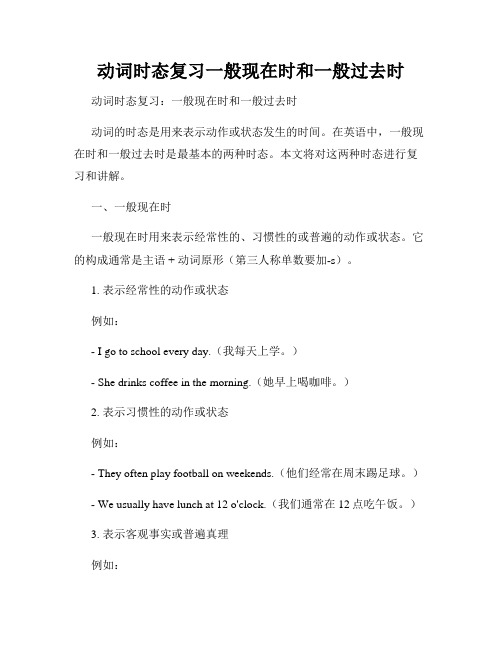
动词时态复习一般现在时和一般过去时动词时态复习:一般现在时和一般过去时动词的时态是用来表示动作或状态发生的时间。
在英语中,一般现在时和一般过去时是最基本的两种时态。
本文将对这两种时态进行复习和讲解。
一、一般现在时一般现在时用来表示经常性的、习惯性的或普遍的动作或状态。
它的构成通常是主语 + 动词原形(第三人称单数要加-s)。
1. 表示经常性的动作或状态例如:- I go to school every day.(我每天上学。
)- She drinks coffee in the morning.(她早上喝咖啡。
)2. 表示习惯性的动作或状态例如:- They often play football on weekends.(他们经常在周末踢足球。
)- We usually have lunch at 12 o'clock.(我们通常在12点吃午饭。
)3. 表示客观事实或普遍真理例如:- The sun rises in the east.(太阳从东方升起。
)- Water boils at 100 degrees Celsius.(水在100摄氏度沸腾。
)二、一般过去时一般过去时用来表示过去发生的动作或状态。
它的构成通常是主语+ 动词过去式。
1. 表示过去的动作或状态例如:- I visited my grandparents last weekend.(上周末我去看望了我的祖父母。
)- She studied English for three hours yesterday.(昨天她学了三个小时英语。
)2. 表示过去的经常性动作或状态例如:- When I was a child, I played with my friends every day.(我小时候,我每天都和朋友们一起玩。
)- We lived in that house for five years.(我们在那个房子里住了五年。
2023年中考英语语法---动词时态专项复习知识点

2023年中考英语语法---动词时态专项复习知识点一、动词的五种基本形式动词主要用来表示动作、状态和性质,而动作和状态的发生有具体的时间和表现方式,这就是英语中动词的时态。
英语中动词的时态由动词的不同形式来表示。
英语动词的五种基本形式为:动词原形、第三人称单数、现在分词、过去式和过去分词。
如:work—works—working—worked—worked。
常见六种时态的构成及用法(1)一般现在时用法:①现在经常性的状态或动作;②客观事实和真理。
构成:①be+表语;②实义动词作谓语标志词:often, sometimes, usually, always, never,twice a month, everyday/week/month/year(every系列)例句:He usually gets to school early.他通常很早到校。
The moon moves around the earth.月亮绕着地球转。
练一练1.认识从实践开始Knowledge practice.2.如果明天下雨,我们就不去公园了。
If it tomorrow,weto the park.【答案】1. begins with.2.rains,won’t go(2)一般过去时用法:表示过去的动作或状态。
构成:①was/were+表语;②实义动词作谓语标志词:a moment ago,just now,ago, yesterday, last night/week/month(last系列) 例句:We went to Yunnan last Monday.上周一我们去了云南。
1.She (not visit)her aunt last weekend.2.My friend,Lucy, (study)for the math test and(practice)English last night.【答案】1.didn’t visit 2.studied practiced(3)一般将来时用法:表示将来的动作或状态。
高考英语动词时态语态复习
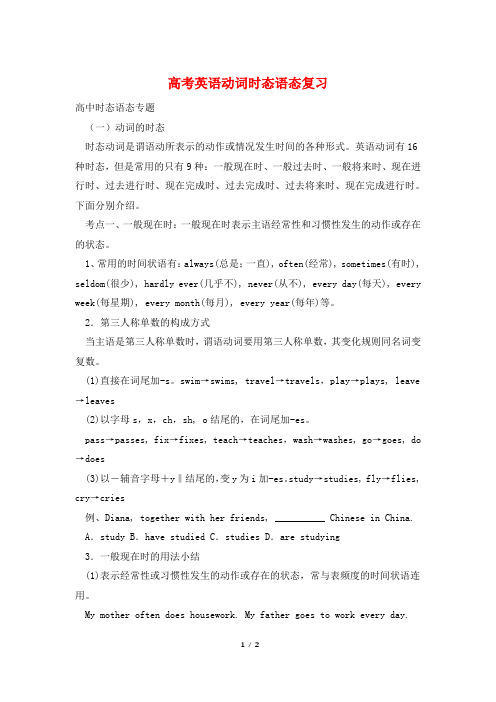
高考英语动词时态语态复习高中时态语态专题(一)动词的时态时态动词是谓语动所表示的动作或情况发生时间的各种形式。
英语动词有16种时态,但是常用的只有9种:一般现在时、一般过去时、一般将来时、现在进行时、过去进行时、现在完成时、过去完成时、过去将来时、现在完成进行时。
下面分别介绍。
考点一、一般现在时:一般现在时表示主语经常性和习惯性发生的动作或存在的状态。
1、常用的时间状语有:always(总是;一直), often(经常), sometimes(有时), seldom(很少), hardly ever(几乎不), never(从不), every day(每天), every week(每星期), every month(每月), every year(每年)等。
2.第三人称单数的构成方式当主语是第三人称单数时,谓语动词要用第三人称单数,其变化规则同名词变复数。
(1)直接在词尾加-s。
swim→swims, travel→travels,play→plays, leave →leaves(2)以字母s,x,ch,sh, o结尾的,在词尾加-es。
pass→passes, fix→fixes, teach→teaches,wash→washes, go→goes, do →does(3)以―辅音字母+y‖结尾的,变y为i加-es。
study→studies, fly→flies, cry→cries例、Diana, together with her friends, __________ Chinese in China. A.study B.have studied C.studies D.are studying3.一般现在时的用法小结(1)表示经常性或习惯性发生的动作或存在的状态,常与表频度的时间状语连用。
My mother often does housework. My father goes to work every day.(2)描述现在的状态、能力、性格等。
英语动词的时态复习及解析百度文库

英语动词的时态复习及解析百度文库一、初中英语动词的时态1.The painting by the artist is world-famous , but several years ago, no one could imagine what an important role he in the painting field.A.was playing B.would play C.played D.had played【答案】B【解析】句意:——这位画家的画举世闻名,但几年前,没有人能想象得到他会发挥重要作用在绘画领域。
several years ago是过去的时间点,“他会在绘画领域发挥重要作用”是在该时间点的将来,所以此处应用过去将来时,其构成为:shoud/would+动词原形,结合选项,可知B选项符合题意,故答案选B。
2.The life we were used to _______ greatly since 1992.A.change B.have changed C.changing D.has changed【答案】D【解析】试题分析:句意:我们过去的生活自从1992年后有了巨大的变化。
本题需要断句正确,we were used to作句子主语的定语,句子缺少谓语动词,根据时间状语since 1992,可知句子的谓语用现在完成时态,主语是the life 用第三人称has changed,故选D。
考点:考查完成时态的用法。
3.—What do you often do at weekends?—I often ________ my grandparents.A.visit B.visited C.have visited D.will visit【答案】A【解析】【详解】句意:你经常在周末做什么?——我经常去看我的爷爷奶奶。
考查句子时态。
A. visit 一般现在时;B. visited 一般过去时;C. have visited现在完成时;D. will visit一般将来时。
初中英语2024届中考语法复习动词时态知识讲解

中考英语语法复习动词时态知识讲解一、时态定义* 时态是英语谓语动词的一种形式,表示动作发生的时间和所处的状态。
* 英语中的时态是通过动词形式本身的变化来实现的。
英语中主要有十六种时态,在初中英语阶段主要掌握六种时态:一般现在时、现在进行时、一般将来时、一般过去时、过去进行时以及现在完成时。
二、一般现在时(一)一般现在时用法:1.一般现在时表示习惯性的动作、讲话时人或物的特性或状态。
Eg: I go to school on foot every day.我每天走路上学She has a cute dog.她又一只可爱的狗。
2.表示自然现象或客观真理时Eg: Light travels more quickly than sound.光的传播速度比声音快。
The Earth goes around the Sun.地球绕着太阳转。
3.在if引导的条件状语从句中,从句用一般现在时Eg: If it rains tomorrow, I will stay at home.如果明天下雨我就呆在家里。
(二)一般现在时的结构1.结构:肯定式:主语 + 谓语动词 + 其它否定式:主语 + don't + 谓语动词 + 其它一般疑问句:Do + 主语 + 谓语动词 + 其它特殊疑问句:特殊疑问词 + 一般疑问句注意:当主语是第三人称单数时,谓语动词要用三单形式,助动词do要变为does。
Eg: 肯定句: I work in Beijing.我在北京工作。
She works in Beijing.她在北京工作。
否定句:I don’t work in Beijing.我不在北京工作。
She doesn’t work in Bejing.她不在北京工作。
一般疑问句:Do you work in Bejing?你在北京工作吗?Does she work in Beijing?她在北京工作吗?特殊疑问句: Where do you work?你在哪工作?Where does she work?她在哪工作?2.动词三单形式变化规则(1)一般情况下直接加-s;Eg: cook -- cooks; work -- works(2)以s, x, ch, sh, o结尾的动词加-es;Eg: catch -- catches; go -- goes; do -- does(3)以辅音加y结尾,将y变成i再加-es;Eg: study -- studies; try -- tries(4)特殊变化:have -- has(三)一般现在时时间标志词一般现在时常与every day, often, usually, always, seldom, sometimes等时间状语连用。
- 1、下载文档前请自行甄别文档内容的完整性,平台不提供额外的编辑、内容补充、找答案等附加服务。
- 2、"仅部分预览"的文档,不可在线预览部分如存在完整性等问题,可反馈申请退款(可完整预览的文档不适用该条件!)。
- 3、如文档侵犯您的权益,请联系客服反馈,我们会尽快为您处理(人工客服工作时间:9:00-18:30)。
动词时态练习一、动词时态、结构、标志词
动词时态练习
一、写出下列动词的过去式和过去分词
is\am_________ fly_______ plant________ are _________
drink_________ play_______ go__________ make ________
does_________ dance________ worry________ ask _________
taste_________ eat__________ draw________ put _________
throw________ kick_________ pass_______ do _________
二、用所给动词的正确形式填空。
1. Listen! Some of the girls ______________( talk) about Harry Potter. Let’s join them.
2. Our teacher, Miss Chen,________ ( speak) English on the radio the day before yesterday.
3. I don’t think I ____________ ( see) you in that dress before.
4. Coffee is ready. How nice it ________ (smell) ! Would you like some?
5. I’m sorry you’ve missed the train. It __________ ( leave)10 minutes ago.
6. ---Mum,may I go out and play basketball?
---_______ you _______ (finish)your homework yet?
7. A talk on Chinese history ____________ (give) in the school next week.
8. You may go fishing if your work ___________ ( do).
9. Cotton __________( feel) nice and soft.
10. The 31st Summer Olympic Games ______________ (hold) in Brazil in 2019.
11. I _______________ ( do) my homework before I went to the cinema yesterday.
12. Last month, many houses in my hometown _______________ ( damage) by the heavy rain.
13. It is said that a new bridge __________________ ( build) over the river next winter.
14. --- Tom, can you help me with the housework?
--- Sorry, mum, I ____________ (repair) for my exam now.
15.The crazy fans ______________ ( wait) outside the hall now, and they will wait till the movie star comes.
16.---- My brother has gone to Shanghai.
---- Oh, could you tell me when he _____________( leave).
17.The day before yesterday, I ____________ ( meet) one of my old friends in the street.
18.It is the first time we ____________ (see) each other since we left school.
19.---You speak Chinese very well.
--- Thanks, I ____________ ( study) it for 4 years before I came to China.
20.My friend, Tom, left New York in 1976 and ______________ (hear of) since then.
21.I_______________ ( take) medicine for 5 successive days, but I still haven’t got over my cold.
22.--- I am afraid I have to leave now. My plane ___________ (leave) at seven.
--- Wish you a smooth journey.
23.He ____________ (talk) about his plans when suddenly the lights went off.
24.--- My cellphone ____________. Can I use yours ?
--- OK. Here you are.
三、单句改错
1.The teacher told that the sun rose in the east.____________
2.I will speak to him when I will see him next Sunday. _____________
3.Jane is doing some cleaning this time yesterday. _________________
4.Mary is making a dress when she cut her finger. _________________
5.This is the first time I had been here. ______________
6.Mother promised she will buy me a bike. _____________。
